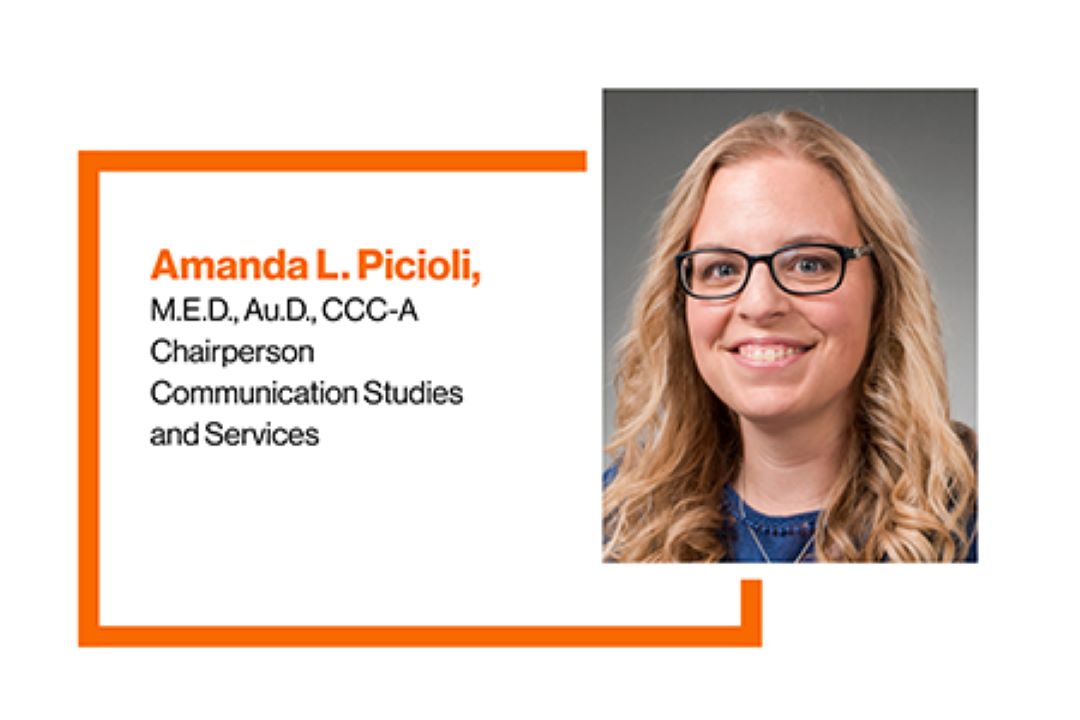RIT/NTID audiologist reviews Apple’s new AirPods Pro 2
RIT/NTID Audiologist Amanda L. Picioli, M.E.D., Au.D., CCC-A, evaluates the benefits and shares offers cautions.
Provided
RIT/NTID Audiologist Amanda L. Picioli, M.E.D., Au.D., CCC-A
Individuals looking for options to improve their listening experience now have a new product to consider: Apple’s AirPods Pro 2 has been released and is being promoted for its ability to improve hearing.
Audiologist Dr. Amanda L. Picioli, M.E.D., Au.D., CCC-A, chairperson of the Communications Studies and Services department at Rochester Institute of Technology’s National Technical Institute for the Deaf in Rochester, New York, says there are several benefits to Apple’s new AirPods Pro 2, along with several cautions.
Picioli and her team of eight audiologists and five speech-language pathologists work with individuals from college-age students through retirees to provide hearing evaluations, consultations, hearing aid trials and programming, cochlear implant mapping and upgrades, assistive technology and accessory fittings, and more. With more than 1,100 deaf and hard-of-hearing students on campus, RIT is the nation’s first and largest technological college for deaf and hard-of-hearing students in the world.
“When new options are introduced into the marketplace, we need to be ready to answer our clients’ questions about their potential advantages and disadvantages,” Picioli said. “For the AirPods Pro 2, we have noted several benefits, but also want our clients to be aware of possible drawbacks.”
AirPods Pro 2 have noise cancellation technology, reducing exposure and ambient sound. Apple’s website states the devices, “Take noise down a notch. Hearing protection translates the sound signatures of what you hear to lower levels in environments as loud as 110 dBA. Machine learning on the H2 chip actively reduces louder, more intermittent noise at 48,000 times per second, and the ear tips provide passive noise reduction.”
These devices also can be used in conjunction with other accessibility features, such as captioning, to enhance an individual’s listening experience. “We know that individuals compensate for hearing loss by depending on other cues, such as captioning, speechreading and situational prompts,” Picioli said. “AirPods could be helpful if used along with what individuals already are doing, often without realizing it.”
For individuals who have been reticent to discuss their hearing status, the AirPods Pro 2 could open up more conversations about hearing health and living with hearing loss. “We all have that family member who is in denial about their loss of hearing. Increased awareness and acceptance of wearing these devices could lead to early detection and intervention,” she said.
But with the good can come some challenges. “AirPods Pro 2 could leave people disappointed with the efficacy of over-the-counter devices, because they may not be appropriate for their specific type of hearing loss,” Picioli said. “This may lead to a disinterest in further appropriate care. It’s important to remember that these devices are designed for general listening, and may not provide adequate amplification and clarity for some.”
Using over-the-counter hearing devices such as AirPods Pro 2 could prevent some individuals from seeking care from a hearing professional, such as an audiologist, which could mean missing more complicated causes of hearing loss. “When this happens, individuals miss out on appropriate treatments and preventative measures, because there is no comprehensive hearing assessment.”
Lastly, Picioli shares this reminder. “AirPods Pro 2 are not medically approved hearing devices. While they can provide some amplification, these devices lack specific features and professional adjustments from a licensed audiologist. Audiologists also provide (re)habilitation strategies, counseling and support to individuals experiencing hearing loss.”
To find an audiologist in your area, visit the American Speech-Language-Hearing Association’s Find a Professional webpage: www.asha.org.




